When Facebook friend, John (Skeets) Richards, suggested I do a blog addressing the issue of whether or not artists are in a “zone” when they paint their best, I thought it was a good topic to pursue. I personally don’t think in those terms, I’m just focused on doing the best painting I can. I will acknowledge that once in a great while some of my paintings have been created so effortlessly and quickly that they seem to have painted themselves…but most of the time it is just tough, down and dirty, hard work…with all the ensuing frustrations.
I guess I never thought of those effortless paintings as having been done while “in the zone”, but maybe that’s a suitable explanation. After considering the opinions expressed below, it’s very possible I’m “in the zone” more than I realize. Having professional artists address the issue will cast light on the subject. It’s hard to deny that something really special can happen when we’re in the creative mode…often unexpectantly. I call it “dancing with the angels”.
I’m honored to have such an elite group of artists address this issue. Here are this weeks participants:
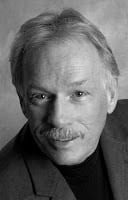 Kenn Backhaus:After an award winning career as a commercial designer and illustrator, Kenn decided in 1984 to devote more time to his passion for painting and his love of the outdoors. He found that capturing true color, value, atmosphere and the mood of a subject was best done on location or through direct observation. Winner of many awards and a featured artist in a 13-part PBS television program “Passport & Palette”, Kenn is a Master Signature Member of the Oil Painters of America and the American Impressionist Society.
Kenn Backhaus:After an award winning career as a commercial designer and illustrator, Kenn decided in 1984 to devote more time to his passion for painting and his love of the outdoors. He found that capturing true color, value, atmosphere and the mood of a subject was best done on location or through direct observation. Winner of many awards and a featured artist in a 13-part PBS television program “Passport & Palette”, Kenn is a Master Signature Member of the Oil Painters of America and the American Impressionist Society.
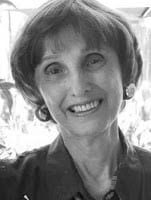 Joni Falk: Joni has lived in Phoenix, AZ since 1960. She has been featured in several magazines and books, and is a popular instructor at the Scottsdale Artist School. Her work is included in the permanent collections of The Cheyenne Old West Museum, The Booth Museum, and The Desert Caballeros Museum. She’s represented by Legacy Galleries, Settlers West…and has participated shows at The National Museum of Wildlife Art and the Cowboy Museum in Oklahoma.
Joni Falk: Joni has lived in Phoenix, AZ since 1960. She has been featured in several magazines and books, and is a popular instructor at the Scottsdale Artist School. Her work is included in the permanent collections of The Cheyenne Old West Museum, The Booth Museum, and The Desert Caballeros Museum. She’s represented by Legacy Galleries, Settlers West…and has participated shows at The National Museum of Wildlife Art and the Cowboy Museum in Oklahoma.
 David Gray:An award winning artist, David has made a career of pursuing a pure and relevant art form which has its roots in the Classical Tradition. The resulting paintings reveal a personal and contemporary expression of beauty and order while giving a clear nod to the Old Masters. David’s works have been collected throughout the United States and abroad since 1997.
David Gray:An award winning artist, David has made a career of pursuing a pure and relevant art form which has its roots in the Classical Tradition. The resulting paintings reveal a personal and contemporary expression of beauty and order while giving a clear nod to the Old Masters. David’s works have been collected throughout the United States and abroad since 1997.
 Marc Hanson:A Signature Member of OPA and winner of the OPA Bronze Medal for oil painting in the 2011 National Exhibition. He was awarded both Artist’ Choice and Best of Show at the 2012 Door County Plein Air Festival. His work can be seen at Addison Art Gallery, R.S. Hanna Gallery, Gallery 1261, Elizabeth Pollie Fine Art, and the Mary Williams Gallery.
Marc Hanson:A Signature Member of OPA and winner of the OPA Bronze Medal for oil painting in the 2011 National Exhibition. He was awarded both Artist’ Choice and Best of Show at the 2012 Door County Plein Air Festival. His work can be seen at Addison Art Gallery, R.S. Hanna Gallery, Gallery 1261, Elizabeth Pollie Fine Art, and the Mary Williams Gallery.
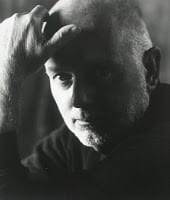 Charles Warren Mundy:Worked as a sports illustrator for several years. In the early 1990’s he took on the challenge of painting in a more impressionistic style, going out of doors and painting “en plein air” and “from life”. Now a noted American Impressionist, he is a Master Signature Member of OPA. Most recently, 2007, he was awarded Master Status in The American Impressionist Society. He is also a Signature Member of The American Society of Marine Artists.
Charles Warren Mundy:Worked as a sports illustrator for several years. In the early 1990’s he took on the challenge of painting in a more impressionistic style, going out of doors and painting “en plein air” and “from life”. Now a noted American Impressionist, he is a Master Signature Member of OPA. Most recently, 2007, he was awarded Master Status in The American Impressionist Society. He is also a Signature Member of The American Society of Marine Artists.
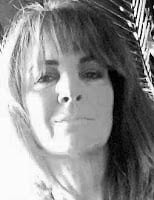 Romona Youngquist:Self taught with nature as her classroom and the great masters her teachers, Romona knew at age four that painting would be her calling. Today you’ll find her paintings as far away as Germany, London, and downtown Manhattan. Her works have been published in the premier art magazines including Southwest Art, American Art Collector, and Art Talk.
Romona Youngquist:Self taught with nature as her classroom and the great masters her teachers, Romona knew at age four that painting would be her calling. Today you’ll find her paintings as far away as Germany, London, and downtown Manhattan. Her works have been published in the premier art magazines including Southwest Art, American Art Collector, and Art Talk.
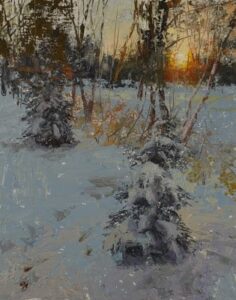
Backhaus: Being in the zone is like a well-oiled machine, you are performing without hesitation, no distractions, and can push yourself and you respond, The challenges that are present or come up during the painting process become solved. The traditional sound principal and foundations guide your skills that you have acquired over the years. Confidence directs the eye and the hand. Everything within you and around you is in harmony.
“In the zone” for me, means my painting seems to almost paint itself…a sense of confidence and satisfaction as the painting progresses.
Gray: To me it means that space in time when everything you do is “right”. In these moments it seems like you can do just about anything. And if you do make a mistake it is corrected with ease and on the spot. It’s a time when everything you’ve learned is working for you. Your background, natural skills, education, and years of hard work are all coming out on the canvas and it’s glorious. You trust yourself implicity and all of your second guessing goes out the window. Ir’s a great place to be.
Hanson: My earliest memories of being an ‘artist’, were while sitting at my parents kitchen table with a newsprint drawing tablet and some pencils and crayons, making action drawings of tanks, soldiers and airplanes at war. Man, was I “in the zone” then. In a place of total imaginative, creative thought, where the question from my mom…”Marc, are you listening to me???”, didn’t even make a sound wave in that zoned world that I was in while the airplanes and helicopters flew over head, while the tanks rumbled across the impossible terrain, and while so many army men became ‘X’s and tanks went up in clouds of red and yellow flames. That is what being in the zone means to me. Being totally absorbed in the act of creative activity, in a heightened state of awareness. Being so absorbed by the painting activity, that nothing else around me has meaning, and time evaporates. It’s letting your conscious mind go to where it needs to go to achieve complete concentration on the task at hand.
Mundy: “In the zone” is a term used by an artist to describe being subconsciously carried along in the painting, making one creative move after another. You may not be aware of being in the zone. The painting experience has mesmerized the artist.
Youngquist: Being “in the zone” is like having a wonderful massage in which you’re conscious but asleep at the same time. It’s the place I want to be. It’s where I reach my optimal creativity and production and where I have the most fun.
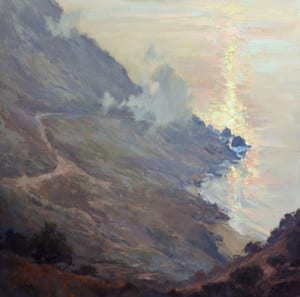
Backhaus: I don’t think you can control when you get into the zone. I feel it happens on its own from one’s focus and enthusiasm of the project.
Falk: Regarding the phenomenon of “in the zone”, I think it is just that…if there were a technique to get there, I sure would like to know what it is…???
Gray: I don’t believe you can force it or make it occur. It just happens sometimes. It comes as a result of years of discipline. I consider that I am highly skilled and have worked very, very hard for many years to develop my craft. I can paint or draw something very well on demand. But that doesn’t mean I’m in the zone. Usually I have to keep my wits about me the entire day of painting and the littlest thing can throw me off. Still I have learned how to fight through and create effectively. Only once in a blue moon do I ever feel like I’m truly in the zone.
Hanson: It’s easiest for me to find myself “in the zone” when outside on location, painting ‘en plein air’. Almost every time that I paint outside, I’m there, in the zone. I think that’s partly why I feel that is the most honest place for me to be painting. Having the time constraint of plein air painting, and the lack of any outside interference, except for the occasional passerby, makes it the ideal situation fo me to find myself in that zone.
In the studio, to help me move into that place of concentration, I choose music to listen to that will help me find that zone once I get a painting going. That changes from day to day, and according to where I am in the painting. At first I like music that is…loud and upbeat. Music that sort of shakes the rafters. Then as I am developing the painting, I turn to music that is softer and less intrusive, that allows me to concentrate. Sometimes I need to turn it off completely and have a silent work zone to zone out in.
Mundy: Problem solving should be the process before ever beginning the painting. The left hemisphere of the brain, the analytical side, is the problem solver. Preparedness in getting everything ready is hugely important. It’s like a surgeon who has everything on the table and ready to go. I also have found in the last six months, that I have more opportunity to get into the zone if I have no music, no distractions. Having the excitement to create, to take on the challenge of a new painting, is a key ingredient and a wonderful start!
Youngquist: The best way for me to get there is to be constantly painting. It’s like a snowball effect and the more I paint the more everything around me disappears (not good for housework). And the ideas just keep coming.
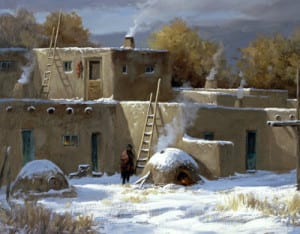
Falk: As far as being more conscious and aware what I’m doing or less so…I definitely think I am aware I’m in the zone in that the painting seems to be flowing and coming together more easily – and with more confidence..
Gray: I think I’m just as conscious. It’s just that all my decisions seem to be “right”. All my marks are spot on. I’m still very cognizant.
Hanson: Yes, I’m totally conscious of what I’m doing when in the zone. I paint without thinking about what I’m doing, but on a conscious level. My experience, training, skills, and desires as an artist become one fluid movement when in this place. Like I mentioned above, it’s a heightened state of awareness that I find myself in when there. Being in the zone is very similar to being in a meditative state. I tried meditation as part of a yoga class I was taking once. I realized that when I’m painting…and in the zone…I’m consistently in a meditative place, so the meditation class was kind of pointless for me.
Mundy: It’s a combination of both being conscious of what you’re doing, and less conscious. But if you really “let go”, it can lean toward being unaware of what you’re doing. There’s a connective interplay between both knowing and not knowing.
Youngquist: I’m less conscious and intuition kicks in. And that’s where the fun and passion happens.
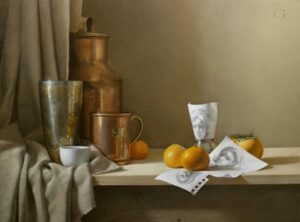
Backhaus: Yes, definitely my better works come from being in the zone.
Falk: I think some of my best paintings were done while “in the zone”, and I look back on them and wonder “how I did that”.
Gray: I think for me there is a slight difference. In general I would say my best work has been done while “zoned in”, but not always. I’ve done some paintings I’m very proud of that have been a fight every step of the way.
Hanson: This is a difficult place to be if you have interruptions by phones, other people, or errands to run for the day. My best work comes when I’m lucky enough to be able to find that level of concentration. Not because there’s anything metaphysical about it, simply because I’m concentrating and keeping a clear path open as I paint along. With too much interruption, I loose the ability to go deeply within myself and my creative thoughts. It makes sense that a painting wouldn’t get the full store of what I feel and have to offer it if I’m not there.
Mundy: Based on my own results, the best paintings can be painted either in the zone or not in the zone. Nevertheless, for creative explorations, every endeavor and experience is different.
Youngquist: Heck ya.
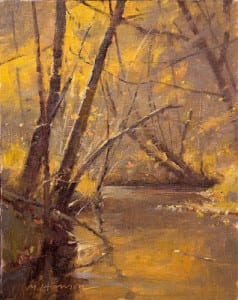
Backhaus: Yes.
Falk: I do think it is possible to produce work beyond normal ability or understanding…it’s as if that feeling of “self-doubt’ disappears.
Gray: I think so. I’m not sure I’ve been there, but I believe it can happen. My process is so controlled that I am very rarely surprised by the result. “Happy accidents” just don’t happen with me. Though highly skilled and a good teacher of my craft, I still don’t consider myself a “Master”. I’m not sure I’ve done a work that completely transcends my earthbound limitations. But I believe it can happen. I’ve heard of these kinds of experiences happening to people working in other art forms as well…musicians, or actors, for example.
Hanson: I’d prefer to say that it’s ‘more possible’ to create the work that you’re capable of making, if you are able to concentrate at the level that being in the zone brings to you and your painting.
Mundy: It is absolutely possible for a “zoned in” person to produce work beyond their normal ability. Retrospective thinking will prove it out.
Youngquist: I think you still only paint to the level of your knowledge, but happy accidents happen. If only I can remember how I did it.
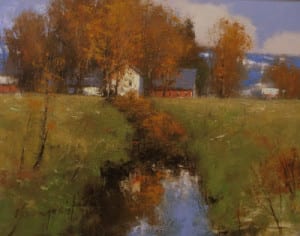
Backhaus: As I mentioned earlier, for me I may be performing for a time period before I realize that I am in the zone. Believe me, you will know it when your’re there. The results of your efforts should reveal it.
Falk: When I am “in the zone” I am definitely aware of it – it’s that special feeling I wish I could experience more often.
Gray: Yes, I think I am.
Hanson: I think this one was pretty much answered in question #3.
Mundy: In most cases, I am not conscious of being “in the zone” although on the other hand, several times, I think that I have made the realization that I’m in the zone while “in the zone”.
Youngquist: It’s the same thing that happens when getting a massage. Your aware but at the same time not….(using linseed oil instead of lavender).
Dave Henderson says
Not more than a week ago I was having this very discussion about “the zone” with other artists at our life drawing group. I too was an illustrator for almost 30 years before starting life anew as a fine artist, swapping agent for gallery. As an illustrator, you never knew what kind of assignment would come knocking at the door, and all arrived with their own set of challenges and problems to solve. So this work also came with many long days and nights in the studio to make deadlines. My day would include many little breaks to step outside and relax in the garden. It was during this time, I first noticed an odd phenomenon. Sitting outside on a beautiful sunlit day, wherever I looked, I was seeing my surroundings in terms of “brushstrokes”. That is to say, my right side brain was so revved up from hours of painting, I was actually perceiving my surroundings very differently. This was the first time I noticed “the zone”, and in this zone, my sense of perception had become keener, and all painting seemed easier with more clarity and focus.
The zone has occurred countless times since I first noticed it many years ago, and will usually arrive after I’ve been immersed in a project for a while. For me, I liken the “zone” to that of “the runner’s high”. In that sense, I do believe the zone can be cultivated. If I find that passion for a subject, that painting you just can’t wait to get on with, I know that somewhere during this work, the zone will occur. And yes, you will know it when you find it. Like the long distance runner, you will find yourself in a place where you feel as though your painting could go on forever…
Dianne Harrison says
I have experienced painting “in the zone” many times and it is an amazing experience. I have yet to find a way to will it to happen. I think of it as a true gift when it does. The two things that make it so rewarding for me are my awareness of the passage of time disappears and all judgement ceases. It makes me realize how detrimental negative self talk can be to my painting process and how the awareness of a limited amount of time interferes with my end result. I have heard professional baseball players describe the slowing down of the ball to the point that they feel they have all the time they need to hit that 110 mph fast ball. That’s how it feels for me when I”m painting in the zone.
I have all the time and all the knowledge I need to do an honest painting. The “zone”
seems to facilitate a painting that says much more to the viewer than what the subject alone reveals.